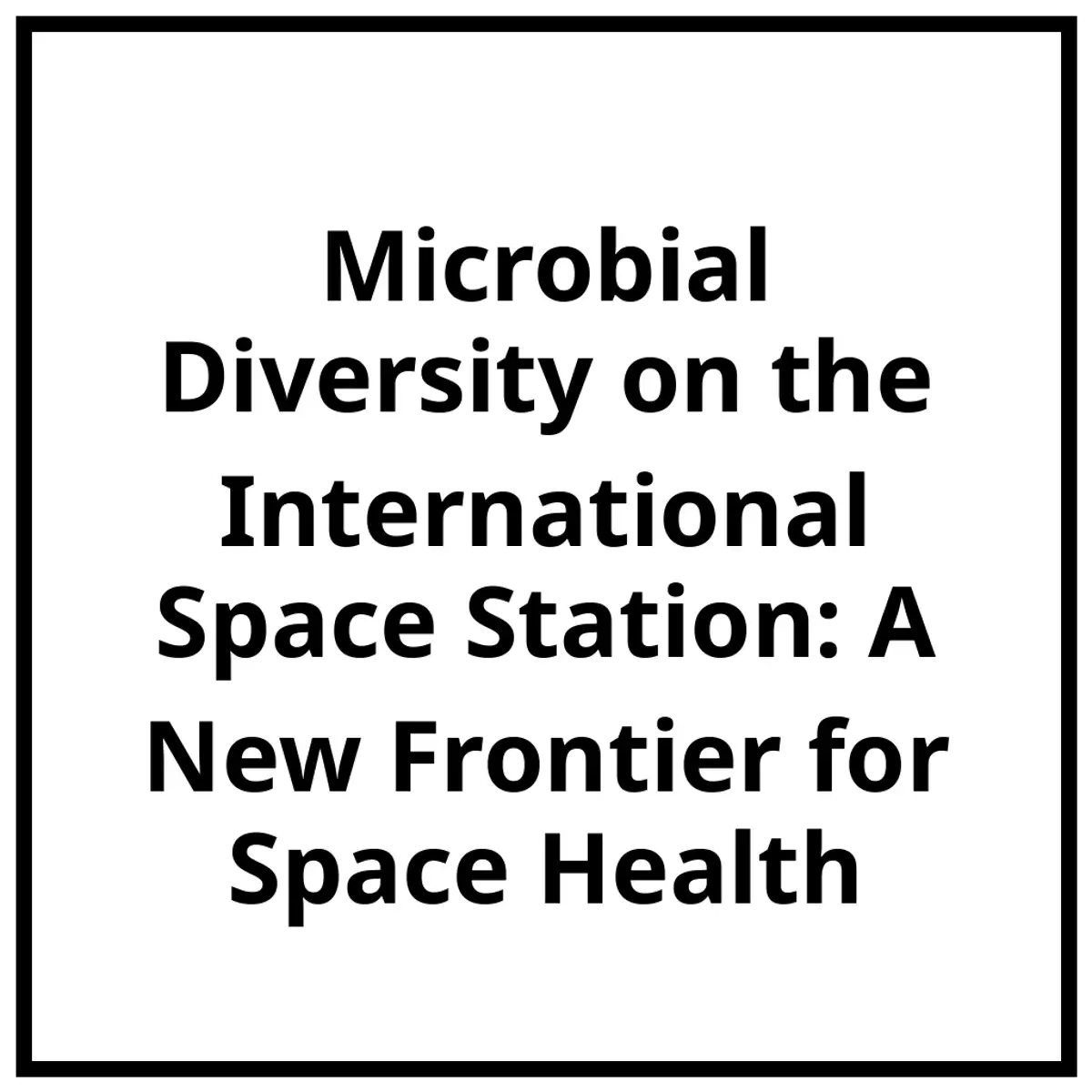Enhancing microbial diversity on the International Space Station is crucial for astronaut health amidst long-duration missions. Learn why this is a transformative step for space exploration.

A groundbreaking study published in the journal *Cell* has shed light on a pressing need in human space exploration: the enhancement of microbial diversity on the International Space Station (ISS). As space agencies gear up for longer missions beyond Earth, including trips to the Moon and Mars, understanding how our microbial companions can contribute to astronaut health has become critically important.
Understanding the Need for Microbial Diversity on the ISS
The Role of Microbes in Human Health
Microorganisms, such as bacteria and fungi, play a vital role in maintaining our immune systems. Here on Earth, we are constantly exposed to billions of these microbes, forming a protective barrier and helping our bodies fight off infections. In controlled environments like the ISS, however, the situation is quite different. The station is designed to minimize microbial contamination, leading to a lack of exposure that could weaken astronauts’ immune responses.
Findings of the Recent Study
Researchers from UC San Diego and NASA undertook an extensive project, analyzing over 800 surface samples from the ISS. The results were compelling. It turns out that the microbial inhabitants aboard the ISS are primarily human-associated microbes—think skin bacteria rather than environmental microbes that flourish in soil or water. This lack of diversity signals a potential risk: the increased likelihood of immune issues among astronauts, who may face spiraling health challenges during long missions.
Key Insights from the Research
The Need for Balance
The study advocates for a paradigm shift: instead of maintaining a hyper-clean environment, future space habitats could benefit from intentionally cultivating diverse microbial ecosystems. This nuanced approach could help astronauts build stronger immune systems, thereby reducing incidences of inflammation and other health complications. As co-first author Rodolfo Salido aptly suggests, it’s about finding a sweet spot that mimics natural microbial exposures found on Earth.
Broader Implications
These findings don’t just affect life beyond Earth. They have valuable ramifications for sterile environments on our planet, including hospitals and research labs. The balance of hygiene and microbial exposure could foster healthier indoor settings everywhere, shifting how we think about sanitization—not just on the ISS but in everyday life.
Navigating Challenges and Controversies
The Hygiene-Conundrum
As exciting as the prospect sounds, the study also raises important questions about how we can introduce beneficial microbes without compromising safety. The stringent cleanliness protocols of the ISS are in place for a reason—to protect astronauts from potential pathogens. Balancing the introduction of diverse microbes while preventing harmful infections is indeed a tightrope walk that researchers will have to navigate.
Potential Solutions
Experts suggest that incorporating elements like indoor gardening could provide exposure to healthy soil microbes while still allowing for a monitored environment. By cultivating a mini-ecosystem within their habitat, astronauts could potentially enjoy the benefits of microbial diversity while still adhering to safety protocols.
Looking Ahead: The Future of Microbial Diversity in Space
Innovations on the Horizon
As researchers work towards refining detection methods for pathogenic microbes aboard the ISS, the prospect of real-time monitoring emerges. Imagine astronauts being able to track their microbial environment, adjusting their habitat in response—this would be a game-changer for mission success and astronaut health.
Conclusion: A New Era in Space Exploration
As we prepare for extended extra-terrestrial exploration, the findings regarding microbial diversity on the ISS become ever more relevant. By acknowledging the critical role of microbes, researchers are setting the stage for the health and success of future missions, not just to the moon or Mars but also in their ongoing work on Earth. In the words of co-first author Nina Zhao, “We noticed that the abundance of disinfectant on the surface of the ISS is highly correlated with the microbiome diversity at different locations on the space station,” highlighting our need to rethink our approach to cleanliness in favor of a more balanced microbiological strategy.
Conclusion: Embracing Microbial Diversity for Healthier Space Missions
The call for increased microbial diversity aboard the International Space Station represents a bold step forward in space health research. As we envision a future filled with interplanetary voyages, understanding the delicate balance between hygiene and microbial exposure will be paramount. By focusing on fostering healthy microbial communities, we can enhance not just astronaut health but also pave the way for a harmonious coexistence between humans and their microbial neighbors—both in space and on Earth.
Frequently Asked Questions (FAQs)
Why is microbial diversity important for astronauts?
Microbial diversity helps maintain a strong immune system, which is crucial for astronauts on long missions. A lack of diverse microbes can lead to immune dysfunction and increased health risks.
How are researchers studying the ISS’s microbiome?
Researchers collected and analyzed over 800 surface samples from the ISS using advanced metagenomic sequencing techniques to understand the microbial communities present.
What are the potential benefits of introducing diverse microbes on the ISS?
Introducing diverse microbial communities could enhance astronaut health by improving their immune response and reducing the likelihood of inflammatory conditions.
What challenges exist in increasing microbial diversity in space?
One major challenge is balancing the need for cleanliness and safety with the introduction of beneficial microbes, ensuring harmful pathogens do not thrive.
Related Videos
This article is based on a study published in the journal *Cell* and reflects the ongoing research into microbial diversity and astronaut health.
Read Also –
| https://www.technologynetworks.com/immunology/news/designing-an-earth-like-microbiome-in-space-could-improve-astronaut-health-396628 |
| https://www.eurekalert.org/news-releases/1074540 |
Hey! I hope you enjoyed reading this! If you did, could you do me a small favor and hit the like button? It would mean a lot to me and help me reach more people. Thank you so much! Got any thoughts on this post? Drop them in the comments below!
How many stars would you give for my effort?





